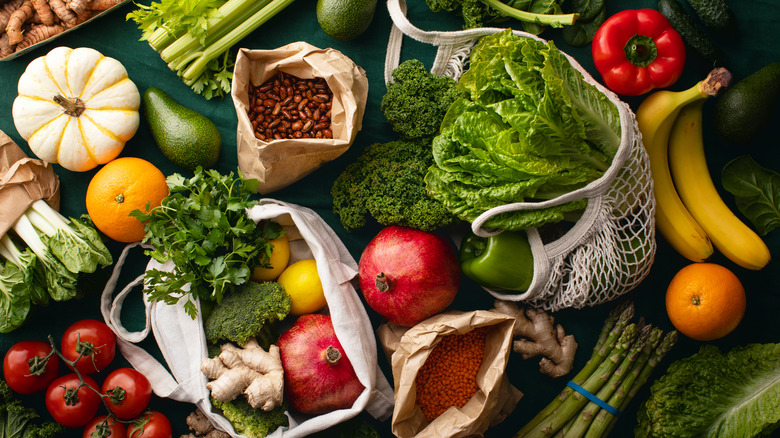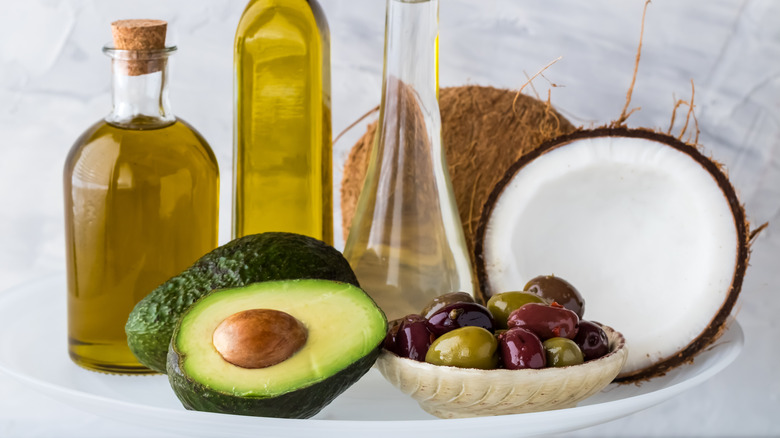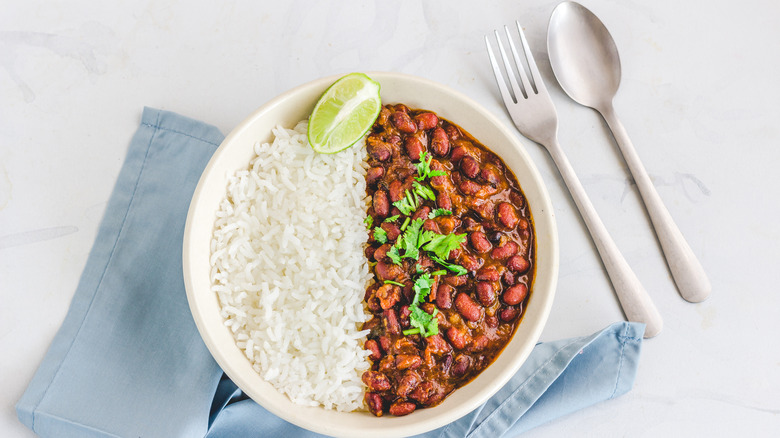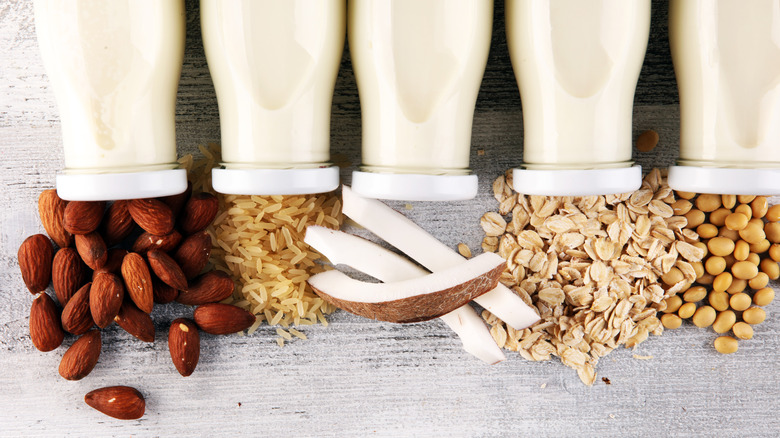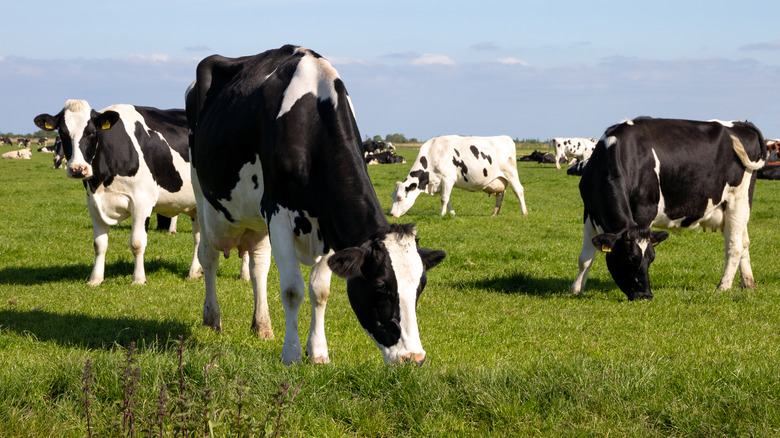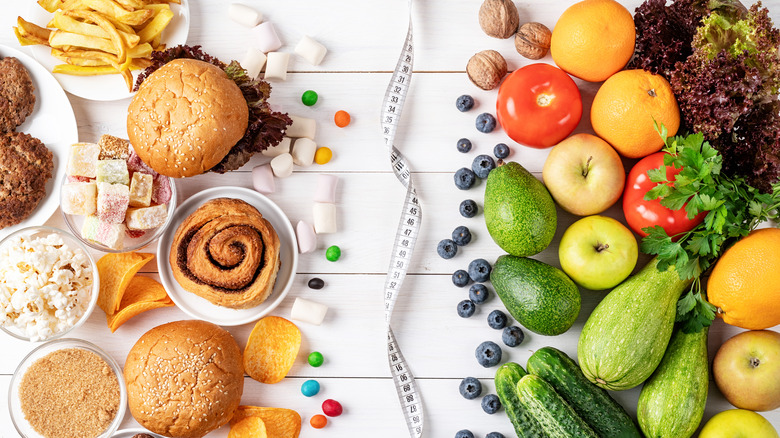Everything Beginners Should Know About Going Plant-Based
Plant-based foods are now in more than half of U.S. households. This was revealed by a 2019 study from IRI, a data analytics and market research company. The study looked at motivations for choosing plant-based products and found the primary reasons to be health and diet-related. The authors also cite data suggesting that about two-thirds of Americans are interested in eating less meat, and one third are choosing to go meatless for one day of the week.
Meanwhile, a 2018 Gallup poll found that self-identified vegans and vegetarians make up only 3% and 5% of the U.S. population, respectively. The researchers point out that these statistics have remained fairly steady since 2012, when 2% said they were vegan and 5% said they were vegetarian. Clearly, the growing interest in plant-based products is not a result of more people choosing to go vegetarian or vegan. For instance, the IRI study noted that some people regularly purchase both dairy and plant-based milks. Interestingly, this group was choosing the plant-based dairy products for health concerns, social consciousness, and the longer shelf life of these products, but they continued purchasing regular dairy products for reasons such as their flavor and appeal to family members.
With this in mind, it's clear that "going plant-based" doesn't have to be all-or-nothing. Anyone interested in trying a plant-based diet will be happy to know that such diets are highly customizable and can be tailored to individual preferences and needs.
People believe plant-based eating is more difficult than it is
A 2019 study from the journal Sustainability surveyed 1,000 omnivores in the U.K., and found that a majority believed vegetarian and vegan diets to be ethical, environmentally beneficial, socially acceptable, and healthy. But a majority of respondents also agreed that these diets are costly, difficult, and not likely to be enjoyable. With this in mind, it's not so surprising that only 14% said they intended to reduce their meat consumption.
While the cost of plant-based foods is sometimes cited as a barrier to choosing them, a plant-based diet actually has the potential to be less expensive than an omnivorous diet. An article from U.S. News points out that meat is more expensive than most other foods, and meat prices are only projected to keep rising. Meanwhile, plant-based foods high in protein (like tofu and beans) are much cheaper than meat.
Plant-based meat products remain more expensive than meat, but this is likely to change. Dr. Liz Specht of the Good Food Institute explains that it is more efficient to derive nutrients from plants than animals (who have to be fed plants), but plant-based meat products are primarily made by smaller companies that can't currently compete with big meat companies. However, demand for plant-based meat is rising, and companies are rushing to catch up and compete for a share of the market. Specht argues that plant-based products will ultimately be cheaper than meat as the industry continues scaling up.
Plant-based meat and dairy markets may grow sharply between 2020 and 2030
In 2020, the global plant-based meat market was approximately $5.5 billion, according to data from Allied Market Research – and it is projected to hit $11.2 billion by 2030. The researchers suggest that plant-based meat products are generally safer than meat from the perspective of food poisoning and contamination, and they cite the COVID-19 pandemic as a turning point in the growth of this industry.
But the plant-based meat industry saw an explosion of growth just before the COVID-19 pandemic. The 2019 launch of the Impossible Whopper by Burger King in collaboration with Impossible Foods saw unprecedented success, according to Business Insider. Carl's Junior also launched a plant-based burger in 2019 in collaboration with Beyond Meat (via National Restaurant News), and KFC launched plant-based chicken in 2022 (per USA Today).
Meanwhile, the global plant-based milk market is already double the size of the global plant-based meat market. According to a study from Persistence Market Research, the plant-based dairy market was valued at $12.1 billion in 2021, and it is projected to grow to $29.5 billion by 2031. The study suggests that plant-based milk is a perfect alternative for those who are lactose intolerant, which could be a majority of people: A review from The Lancet estimates as much as 68% of the world's population experiences lactose malabsorption, or poor digestion of lactose, which could cause lactose intolerance (via the British Medicine Journal).
Plant-based diets don't have to be fully vegetarian or vegan
Some people are vegetarian or vegan for ethical and/or environmental reasons. However, research suggests this isn't the primary reason people are interested in plant-based diets. According to a study from PLOS One that surveyed around 7,500 participants in English and Dutch, the primary motive for omnivores to consider trying vegetarian diets was personal health.
Another study from Sustainability found health motives to be a driving force in non-vegetarians wanting to reduce their meat consumption, but this study also observed that such motives appeared to be "reversed for vegetarians and vegans," who primarily cite animal welfare as the reason for their diet. The researchers argue that this makes sense: Caring about animal welfare is more likely to make a person want to avoid meat altogether than wanting to improve their health (or the environment's), which can be achieved simply by reducing or limiting meat consumption. In other words, you need not go completely vegetarian to experience the benefits of eating less meat and more plants.
As Harvard Health explains, a plant-based diet is simply any diet or eating pattern focused primarily on plants. There isn't a strict definition, but the general idea is to get the majority of your calories from plant-based foods. This could include going meatless for one (or more) days per week, a version of the vegan before 6 p.m. plan (via WebMD), or any other possible variation of primarily eating plants.
Plant-based diets can also be low-carb
Plant-based diets are often high in carbohydrates (via Consultant 360). This makes sense, because carbohydrates are found almost exclusively in plant foods (per Harvard Health). The only exception is dairy, which contains lactose (a type of sugar), but all plant foods contain carbohydrates in the form of sugars, starch, and fiber. Plant-based diets high in carbohydrates and low in fat were found to be associated with weight loss and improved insulin function in a randomized clinical trial from Nutrients. Participants in the experimental group met with registered dietitians and cooking instructors to help them with their new eating plan, which might have contributed to the healthfulness of their new diets.
However, many people are interested in limiting carbohydrates. For instance, the Mayo Clinic explains that low-carb diets are popular among those trying to lose weight, and there is some evidence that low-carb diets cause faster weight loss than other diets for weight loss. If you are interested in trying a plant-based diet but prefer to eat low-carb, the good news is that you can do both. As explained by Healthline, there are many healthy foods that are both low in carbohydrates and also vegetarian: non-starchy vegetables, low-sugar fruits like berries, avocados, olives, nuts, seeds, coconut, dark chocolate, some legumes, etc. Despite being low in sugar, these foods contain plenty of fiber, a crucial nutrient that is sometimes lacking in very low-carb diets (per Healthline).
The Mediterranean diet is considered a plant-based diet
The Mediterranean diet is known to provide a host of health benefits. It was ranked the best overall diet by a panel of experts from U.S. News in 2021. The panelists cite a 2019 systematic review from Nutrients, which found that the Mediterranean diet could help prevent diabetes and heart disease and improve symptoms in those who already had these health conditions. Another review and meta-analysis from the British Medical Journal found the Mediterranean diet to be associated with a reduction in mortality, a lower incidence of cancer, and a lower incidence of other chronic diseases.
As explained by U.S. News, there isn't a single kind of "Mediterranean diet," but a variety of diets eaten primarily in the Mediterranean region that have some common elements. One of these is the focus on plants: The staples of the diet are veggies, fruits, grains, legumes, nuts, seeds, olive oil, spices, and herbs. The diet can also include eggs, poultry, seafood, yogurt, and cheese, but these are enjoyed in moderation and not regularly. Meanwhile, red meat and sugary sweets are eaten sparingly. In other words, no food group is off limits, but plants are the staple.
Harvard Health labels the Mediterranean diet a plant-based diet — but more than that, it is a whole foods, plant-based diet, or a plant-based diet that minimizes highly processed foods (via Healthline). It's a great option for those considering going plant-based.
A vegetarian or vegan diet may lower your risk of cancer
Diets that eschew meat altogether may confer significant protection against cancer. A systematic review and meta-analysis from Critical Reviews in Food Science and Nutrition found that vegetarian and vegan diets were associated with a lower incidence of cancer (as well as ischemic heart disease). Another review from the Annals of Nutrition and Metabolism found similar results: Overall cancer incidence was significantly lower among vegetarians.
This is consistent with evidence that suggests some types of meat may be carcinogenic. The World Health Organization has labeled processed meat a Group 1 carcinogen (sufficient evidence of carcinogenicity), while red meat is classified as a Group 2 carcinogen (limited evidence of carcinogenicity). Moreover, while little evidence suggests that chicken itself is carcinogenic, certain cooking methods are known to produce carcinogens when preparing chicken, as found by a study from Cancer Research. Roasting or stewing chicken appeared to be the safest methods, although higher concentrations of carcinogens were found with longer cooking times, higher temperatures, and greater levels of browning.
That said, plant-based diets that include a limited amount of meat can also protect against cancer. A review from Nutrients found the Mediterranean diet to be very protective against cancer, specifically mentioning the high levels of antioxidants (cancer-fighting compounds) found in the staples of the diet (vegetables, fruits, nuts, red wine, etc.) — which have the potential to offset any carcinogens from occasional meat consumption.
The idea of complete or incomplete proteins may be a myth
At some point in your life, you may have been told that combining certain foods can provide a "complete protein." As the Cleveland Clinic explains, there are 20 types of amino acids — the building blocks of protein — and 9 of them are considered essential, since we supposedly can't synthesize them ourselves and have to get them from food. A food is considered a complete protein if it contains high levels of all 9 essential amino acids. While most of these foods are animal-based foods, some plant-based foods — including whole soy products (like tofu), quinoa, amaranth, and buckwheat — are either complete or nearly complete on their own (via Healthline).
For so-called incomplete sources of protein, the recommendation has been to combine them to make sure that all 9 essential amino acids are in each meal. For instance, the American Heart Association recommends combining beans and rice to make a complete protein. While rice and beans do make a healthy meal, combining specific foods to create a complete protein may not be necessary. Registered dietitian nutritionist Rachel Stockle explains (via the Cleveland Clinic) that you don't need to mix and match specific foods at each meal to make sure you're getting enough of each essential amino acid. She goes on to say that any diet with a sufficient variety of whole plant foods will provide plenty of all essential amino acids (which Healthline suggests as well).
Modern vegan diets provide plenty of protein, but should be supplemented with vitamin B12
A major concern among those who are thinking of limiting or cutting out meat is protein, but little to no evidence suggests that vegetarians or vegans are at risk for protein deficiency. As an article from Business Insider asserts, plant-based sources of protein can provide more than enough protein for a healthy diet. Additionally, a study from Nutrients found that vegetarian and vegan diets provide more than adequate protein. While vegetarian and vegan diets provide less protein than meat-heavy diets, the amount of protein you can get from them is still beyond what is necessary.
That said, vegan diets may need to be supplemented with vitamin B12, as recommended by an article from De Gruyter. The authors also mention calcium, iron, and vitamin D as additional micronutrients to monitor on a vegan diet. Many plant foods contain abundant calcium (e.g. soy foods, legumes, and leafy greens, per Healthline). Iron can also be found in a variety of plants (e.g. dried fruits, nuts, and seeds, via WebMD). Meanwhile, vitamin D can be obtained from sunlight exposure (as explained by a study from Dermato-endocrinology). Even vitamin B12 can be obtained from plants, including nori (a type of seaweed), according to another study from Nutrients. In general, though, the De Gruyter article recommends supplementing a vegan diet with B12 supplements and/or fortified foods such as plant-based milks.
Soy milk and other plant-based milks are often fortified with various nutrients
When replacing dairy milk with plant-based milk, it's a good idea to look for a plant-based milk that offers a similar nutrient package to that of dairy. According to the USDA, the nutritional profile of soymilk is very similar to that of dairy milk in terms of calcium, vitamin B12, vitamin D, and protein. Of course, this depends largely on the specific brand: Different brands of soymilk add different amounts of these nutrients, so you'll want to check the label to make sure all these nutrients are covered before choosing a brand. The same is true for almond milk, oat milk, flax milk, and all other types of plant-based milk. As explained by Healthline, such non-dairy milks are often fortified with vitamin B12.
However, these aren't the only plant-based sources of vitamin B12. A study from Nutrients also points out that many breakfast cereals are fortified with vitamin B12. Additionally, Healthline mentions fortified nutritional yeast as another plant-based source of vitamin B12, and the Nutrients study found high levels of vitamin B12 in nori (seaweed). A study from the Journal of Food Biochemistry also found spirulina, a type of algae sold as a powder or supplement, to be a good source of bioavailable vitamin B12. And of course, vitamin B12 supplements can always be used to ensure you're getting enough.
Limiting animal-based foods has a direct effect on the environment
While Americans are choosing plant-based foods primarily for their health (via a study from Sustainability), this isn't the only compelling reason to go plant-based.
As explained by a study from Advances in Nutrition, "the progression from omnivorous to ovolactovegetarian and vegan diets is associated with increased environmental sustainability." (Ovolactovegetarian refers to a vegetarian diet that includes eggs and dairy.) The researchers go on to claim that the reductions in greenhouse gas emissions from a vegan diet are 50%, while the reductions from a vegetarian diet are 35%. Of course, these are averages, and the actual contributions to greenhouse gas emissions will depend somewhat on the variation between individual diets, but limiting meat and other animal-based products directly limits the greenhouse gas emissions contributed by your diet.
A review from Advances in Nutrition found plant-based diets to be optimized to benefit both individual and environmental health. The researchers found reductions in meat (particularly red meat) optimal for nutrition and sustainability, but they also note that half of the studies reviewed (6 of 12) found increased fish consumption to be beneficial for nutrition, but not necessarily for the environment. The researchers further point out that the increase in fish consumption was encouraged to obtain adequate levels of the omega-3 fatty acids DHA and EPA in some studies, but these nutrients could have also been obtained from microalgae, something the studies didn't test.
Animal-based ingredients can show up in unexpected places
When choosing to go plant-based, it's important to decide what this means to you, and to what extent you want to try to avoid the animal-based products inadvertently hiding in places you wouldn't expect.
For instance, gelatin is derived from collagen, which is derived from the skin and bones of animals (per the Encyclopedia Britannica). It is used primarily as a food additive to create a gel-like consistency in many products, such as candy, marshmallows, and other desserts. It's also used in some types of pills, such as dietary supplements. Plenty of dietary supplements and other capsules are also made without gelatin, though, as are many of the aforementioned processed foods. It's a good idea to read the labels of such products if you're concerned about whether they contain gelatin.
Besides gelatin, refined sugar is another surprisingly non-vegetarian ingredient. A study from the American Chemical Society claims that bone char has been used for over a century as the primary refining agent to process raw sugar and lighten its color. This means many refined sugar companies (and the additional products that are made with them) are technically not vegetarian, though some are. Healthline also identifies a number of other animal-based ingredients that show up in some processed foods, such as casein (milk protein) and isinglass (a derivative of fish bladders). Those interested in avoiding such products can always check product labels or search online to be sure.
The hardest part of trying vegetarianism may be the social obstacles
A study from Current Opinion in Food Science explains that vegetarians constitute a social minority, and social minorities tend to have worse health outcomes than members of the majority. In the case of vegetarians, the researchers hypothesize that increased levels of depression are sometimes associated with vegetarianism, in part due to negative psychological outcomes as a result of potentially being rejected or excluded from a variety of groups or places for adhering to a social minority. This is supported by evidence from the same study that U.S. immigrant populations with high levels of vegetarianism are less likely to be depressed than their omnivorous relatives, in part because they aren't social minorities in their communities.
Thankfully, going plant-based is different from going vegetarian. Biochemist Thomas Colin Campbell says in a 2019 interview with the New York Times that he coined the term "plant-based" in order to make his diet research more palatable to skeptical colleagues at the NIH in 1980. He wanted to emphasize science without "ethical or philosophical considerations." While there's nothing wrong with ethical or philosophical considerations, the "plant-based" terminology has long since entered the public vernacular. As the article further explains, the "plant-based" label is currently being adopted by people who prefer to focus on health without implicitly commenting on ideology, and it appears to be more socially acceptable and less isolating than the label "vegetarian."
As with any diet, a plant-based diet can be healthy (or not)
Those who adopt plant-based diets often do so to improve their health (via a study from Sustainability). But plant-based diets aren't guaranteed to be healthy.
Research from the American Society of Nutrition shows that reducing meat consumption is often associated with a higher consumption of ultra-processed foods. While plant-based diets were still found to be healthier than their animal-based counterparts, the research suggests there is considerable variability among plant-based and vegetarian diets, and diets high in ultra-processed plant-based foods may not confer the same health benefits as those obtained from whole plant-based foods. Such ultra-processed plant-based foods include plant-based meat alternatives, not all of which can be described as healthy (per Healthline).
The biochemist who claims to have coined the term "plant-based," Thomas Colin Campbell, explains in a New York Times interview that he now advocates for a "whole food, plant-based diet." The addition of the phrase "whole food" is meant to refer to unprocessed or minimally processed plant foods, in contrast to ultra-processed foods (or foods made from "substances extracted from foods," according to Harvard Health). Such processed foods are known to pose health risks. A randomized controlled trial from Cell Biology found that ultra-processed diets could cause weight gain, in part by contributing excess sugar and fat (but not protein). Processed foods are designed to be addictive (via the Cleveland Clinic) but nutritionally inadequate, so it is easy to overeat them.
A healthy plant-based diet requires planning
As Healthline notes, healthy vegan diets require planning. This is especially true any time you travel: You can't simply rely on the food environment of wherever you happen to be at the moment to provide your next healthy meal.
The same is true for those following any sort of plant-based diet, to the extent that the goal of such diets is to be healthy. For instance, if you're at a rest stop along the highway hoping to find dinner, your plant-based options might be limited to things like ultra-processed snack foods. Fresh vegetable salads are not typically a staple of fast food menus.
While you may be able to rely increasingly on the plant-based meat alternatives of fast food restaurants like Burger King (per Business Insider), planning ahead and preparing or acquiring healthier food ahead of time is a better option when you want to prioritize your health. Healthline provides a suggested list of plant-based staples to keep on hand, as well as a sample vegan menu for the week. For those with limited time or resources to cook, many meal delivery services now offer plant-based options (via Good Housekeeping). Whether or not you cook regularly, taking the time to plan your daily or weekly meals can help you maintain a healthy plant-based diet. Focus on healthy foods you enjoy, and remember that occasional indulgences are also part of a healthy diet (via the American Heart Association).

